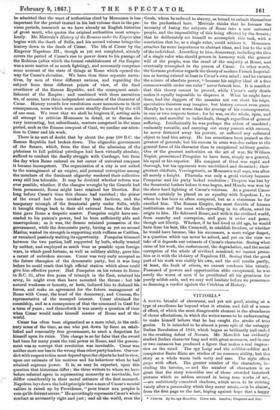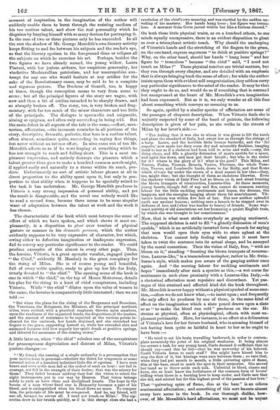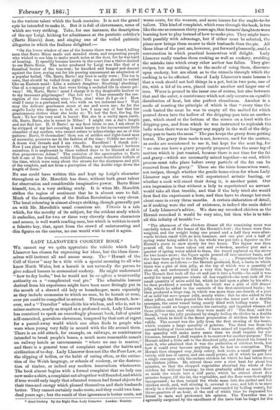VITTORIA.*
A NOVEL brimful of cleverness, and yet not good, aiming at a. type of excellence far beyond what it attains, and full of a sense. of effort, of which the most disagreeable element is the abundance of clever affectations, in which the writer seems to be endeavouring to make himself believe that he has caught the stroke of true genius. It is intended to be almost a prose epic of the unhappy Italian Revolution of 1849, which began so brilliantly and endul in the crushing defeat of Novara. Mr. Meredith has evidently studied Italian character long and with great acuteness, and in one or two instances has produced a figure that makes a real impres- sion on the mind. The spy Luigi and the cobbler-soldier and conspirator Barto Rizzo are studies of no common ability, but the story as a whole wants both unity and ease. The style often gasps with effort. The greater number of the characters, in- cluding the heroine, — and the number of characters is an great that the story resembles one of those crowded historical pictures which so seldom succeed in being true works of art, —are ambitiously conceived shadows, which seem to be striving vainly after a personality which they never attain,—to be almost, from the first page to the last, hoping against hope that a happy * Vittoria. By George Meredith. Three rola. London; Chapman and Halt
moment of inspiration in the imagination of the author will suddenly enable them to burst through the resisting medium of his too restless talent, and show the real personality which he disguises by busying himself with so many devices for portraying it.
In the case of two or three pictures only he has succeeded. In all the rest the shadow of Mr. George Meredith's own literary activity keeps flitting to and fro between his subjects and the reader's eye,
so that the literary egotism in the foreground dims or eclipses all the subjects on which he exercises his art. Perhaps, besides the two figures we have already named, the young widow, Laura Piaveni, with her jealous ardours, her suspicious generosity, her vindictive Machiavellian patriotism, and her unscrupulous con- tempt for any one who would hesitate at any artifice for the sake of the Revolutionary cause, may be said to be a complete and vigorous picture. The Duchess of Graitli, too, is happy
at times, though the conception seems to vary from scene to scene ; but all the principal figures of the story are vague, with now and then a bit of outline intended to be sharply drawn, and as abruptly broken off. The story, too, is very broken and frag- mentary, with far too much of the minor characters and too little of the principals. The dialogue is spasmodic and enigmatic, aiming at epigram, and often only succeeding in being odd. But the main defect in all aspects of the tale is the same,—effort, man- nerism, affectation, —the incessant reminder in all portions of the atory, descriptive, dramatic, pathetic, that here is a restless talent, often almost, sometimes quite, succeeding in saying flue things, Jut never without an intense effort. In nine cases out of ten Mr. Meredith affects us as if he were leaping at something which he has not strength to reach and falling short. This is a most un- pleasant impression, and entirely destroys the pleasure which a talent greater than goes to make a hundred common novels might, if applied easily and naturally to a theme within its reach, pro- duce. Unfortunately no sort of artistic labour pleases at all in direct proportion to the ability spent upon it, but only in pro- portion to that ability when it happens to be specially suited to
-the task it has undertaken. Mr. George Meredith produces in Vittoria a very strong impression of personal ability, and yet
the result is disagreeable, and the novel one nobody would like to read a second time, because there seems to be some singular want of adaptation between the talent at work and the work it has chosen.
The characteristic of the book which most betrays the sense of e ffort of which we have spoken, and which shows it most un-
pleasantly, is a disposition to gloat over touches of physical gesture or manner in his dramatis persons, which the author .evidently supposes to be very expressive of character, but which, -owing either to defective imagination or inadequate expression, -fail to convey any particular significance to the reader. We could produce examples of this almost in every other page. Thus, the heroine, Vittoria, is a great operatic vocalist, engaged (under -4‘ the Chief," evidently M. Mazzini) in the great conspiracy for the rising of Milan. She is of course young and beautiful, lull of every noble quality, ready to give up her life for Italy, utterly devoted to "the chief." The opening scene of the book is
one in which "the chief," on the top of Monte Motterone, details his plan for the rising to a knot of chief conspirators, including Vittoria. While "the chief" dilates upon the value of women to the cause, the heroine is comparatively little interested ; then we are told :—
" Bat when the plans for the rising of the Bergamacs and Brescians, the Venetians, the Bolognese, the Milanese, all the principal northern -cities, were recited, with a practical emphasis thrown upon numbers, apon the readiness of the organized bands, the dispositions of the leaders, and the amount of resistance to be expected at the various points in- -dictated for the outbreak, her hands disjoined, And she stretched her fingers to the grass, supporting herself so, while her extended chin and animated features told how eagerly her spirit drank at positive springs, and thirsted for assurance of the coming storm."
A little later on, when "the chief" rebukes one of the conspirators or presumptuous depreciation and distrust of Milan, Vittoria's posture changes :—
4" My friend, the nursing of a single antipathy is a presumption that sour motive force is personal—whether the thirst for vengeance or some internal union of a hundred indistinct little fits of egotism. I have seen brave and even noble men fail at the ordeal of such an hour : not fail in -courage, not fail in the strength of their desire; that was the misery for them ! They failed because midway they lost the vision to select the right instruments put in our way by Heaven. That vision belongs solely to such as have clean and disciplined hearts. The hope in the bosom of a man whose fixed star is Humanity becomes a part of his hlood, and is extinguished when his blood flows no more. To conquer him, the principle of life must be conquered. And he, my friend, will use all, because he serves all. I need not touch on Milan.' The sig- norina drew in her breath quickly, as if in this abrupt close she had a
revelation of the chief's own meaning, and was startled by the sudden un- veiling of his mastery. Her hands hung loose ; her figure was tremu- lous. A murmur from Corte jarred within her like a furious discord."
On both these little physical traits, as on a hundred others, to our minds equally unexpressive, there is an evident disposition to gloat as over a triumphant artistic touch. Why should the unclasping of Vittoria's hands and the stretching of the fingers to the grass, on the one hand, express eagerness "to drink at positive springs?"
Why, on the other hand, should her hands "hang loose" and her figure be " tremulous " because "the chief" said, "I need not touch on Milan ?" These physical touches are trivial matters, but they run through every chapter, and are detailed with an emphasis that is always bringing back the sense of effort ; for while the author insists upon them with evident self -congratulation, they seldom carry any particular significance to the mind of the reader. It may be that they ought to do so, and would do so if something that is assumed but unexpressed at the heart of Mr. Meredith's own imagination had been expressed. But as it is, we only wonder at all this fuss about something which conveys no meaning to us.
So again, spoiled by a similar species of affectation are some of the passages of eloquent description. When Vittoria finds she is unjustly suspected by some of the band of patriots, the following description is given of her pain, as she walks in the streets of Milan by her lover's side :—
" The feeling that it was she to whom it was given to lift the torch and plant the standard of Italy, had swept her as through the strings of a harp. Laura, and the horrible little bronze butterfly, and the Sei sospetta,' now made her duty seem dry and miserably fleshless, imaging itself to her as if a skeleton had been told to arise and walk :—say, the thing obeys, and fills a ghastly distension of men's eyelids for a space, and again lies down, and men get their breath ; but who is the rosier for it ? where is the glory of it ? what is the good? This Milan, and Verona, Padua, Vicenza, Brescia, Venice, Florence, the whole Vene- tian, Tuscan, and Lombardi° lands, down to far Sicily, and that Rome which always lay under the crown of a dead sunset in her idea—they, too, might rise; but she thought of them as skeletons likewise. Even the shadowy vision of Italy Free had no bloom on it, and stood fronting the blown trumpets of resurrection, Lazarus-like. At these moments, young hearts, though fall of sap and fire, cannot do common nursing labour for the little suckling sentiments and hopes, the dreams, the languors, and the energies hanging about them for nourishment. Vit- toria's horizon was within five feet of her. She saw neither splendid earth nor ancient heaven; nothing save a breach to be stepped over in defiance of foes and (what was harder to brave) of friends. Some way- ward activity of old associations set her humming a quaint English tune, by which she was brought to her consciousness."
Now, that is what must strike everybody as gasping sentiment. The supposed skeleton is said to fill "a ghastly distension of men's eyelids," which is an artificially inverted form of speech for saying that men would open their eyes wide to stare aghast at the skeleton. You cannot help feeling what pains it must have taken to twist the sentence into its actual shape, and be annoyed by the moral contortion. Then the vision of Italy, free, "with no bloom on it," standing "fronting the blown trumpets of resurrec- tion, Lazarus-like," is a tremendous metaphor, rather in Mr. Swin- burne's style, which makes you aware of the gasping author once again. And "the nursing labour for suckling sentiments and hopes" immediately after such a spectre as this,—a wet nurse for sentiments in such close proximity with a Lazarus-like Italy,—is a rhetorical affectation most repulsive and discordant. Yet pas- sages of this strained and affected kind dot the book throughout. Mr. Meredith is never happy without a physical symbol of some emo- tion,—of ten we do not know what,—to insist upon ; and frequently the only effect he produces by one of these, is the same kind of
effect on the imagination which a slate pencil drawn upon a slate so as "to make the blood run cold" produces on the ear. He strains at physical, often at physiological, effects with most un- pleasant pertinacity. Here, for instance, is an effort at a delineation of Vittoria's love for her future husband, who is accusing himself of not having been quite as faithful in heart to her as he ought to
have been :—
" He tried to set his brain travelling backward, in order to contem- plate accurately the point of his original weakness. It being almost too severe a task for any young head, Carlo deemed it sufficient that he should say—and this he felt—that he was unworthy of his beloved. Could Vittoria listen to such stuff? She might have kissed him to atop the flow of it, but kissings were rare between them ; so rare that, when they had put mouth to mouth, a little quivering spire of flame, dim at the base, stood to mark the spot in their memories. She moved her hand as to throw aside such talk. Unfretful in blood, chaste and keen, she at least knew the foolishness of the common form of lovers' trifling when there is a burning love to keep under, and Carlo saw that she did, and adored her for this highest proof of the passion of her love."
That "quivering spire of flame, dim at the base" is an odious sentimental affectation; and something of this sort haunts almost every love scene in the book. In our thorough dislike, how- ever, of Mr. Meredith's hard affectations, we must not be unjust
to the various talent which the book contains. It is not the grand epic he intended to make it., But it is full of clevernemes, some of which are very striking. Take, for one instance, the description of the spy Luigi, kicking for admittance at the patriotic cobbler's (Barto Rizzo's) door, and singing one of the veiled patriotic allegories in which the Italians delighted :—
" On the lower window of one of the houses there was a board, telling men that Barto Rizzo made and mended shoes, and requesting people who wished to see him to make much noise at the door, for he was hard of hearing. It speedily became known in the court that a visitor desired to see Barto Rizzo. The noise produced by Luigi was like that of a fanatical beater of the tom-tom; he knocked and banged and danced against the door, crying out for his passing amusement an adaptation of a popular ballad, 'Oh, Barto, Barto ! my boot is sadly worn : The toe is seen, that should be veiled from sight : The toe that should be veiled like an Eastern maid : Like a sultan's daughter: Shocking ! shocking! One of a company of ten that were living a secluded life in chaste pri- vacy! Oh, Barto, Barto ! must I charge it to thy despicable leather or to my incessant pilgrimages? One fair toe ! I fear presently the cor- ruption of the remaining nine: Then, alas ! what do I go on ? How shall I chine to a perfumed end, who walk on ten indecent toes ? Well may the delicate gentlemen sneer at me and scorn me: As for the -angelic Lady who deigns to look so low' I may say of her that her graciousness clothes what she looks at : To her the foot, the leg, the beck: To her the very soul is bared : But she is a rarity upon earth.
Barto, Barto, she is rarest in Milan ! I might ran a day's length and not find her. If, 0 Bartel as my boot hints-to me, I am about to be stripped of my last covering, I must hurry to the inconvenient little chamber of my mother, who cannot refuse to acknowledge me as of this pattern: Barto, 0 shoemaker! thou son of artifice and right-hand man -of necessity, preserve me in the fashion of the time: Cobble me neatly: A dozen wax threads and I am remade. Excellent! I thank you : Now I can plant my foot bravely: Oh, Barto, my shoemaker ! between ourselves, it is unpleasant in these refined days to be likened at all to -that preposterous Adam !' The omission of the apostrophes to Barto deft it one of the ironical, veiled Republican, semi-Socialistic ballads of
t he time, which were sung about the streets for the sharpness and pith -of the couplets, and not from a perception of the double edge down the length of them."
No one could have written this and kept up Luigi's character throughout as Mr. Meredith has done, without both great talent for observation and considerable imaginative power. Barto Rizzo himself, too, is a very striking study. It is when Mr. Meredith -strikes the region of sentiment that he is almost sure to fail. Much of the description of the Italian Revolution is very clever. 'The local colouring is almost always striking, though generally put
o n with Mr. Meredith's usual conscious air. Vittoria is a tale which, for the novelty of its subject, for the evident study which it embodies, and for two or three very cleverly drawn characters and scenes, is well worth reading once, but which is written in such a falsetto key, that, apart from the crowd of uninteresting and
































 Previous page
Previous page